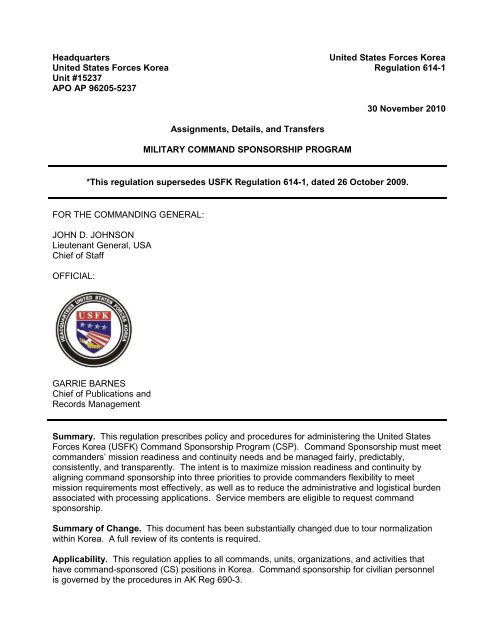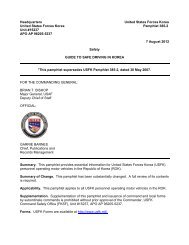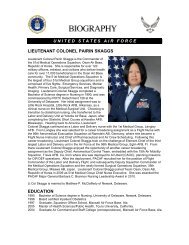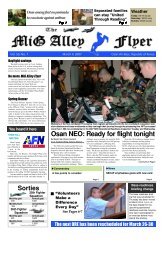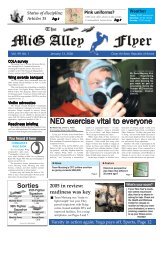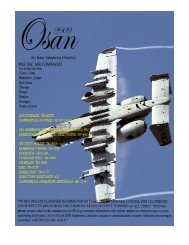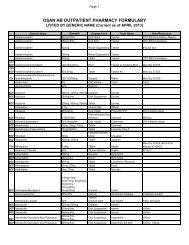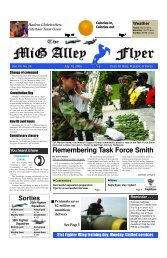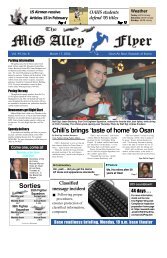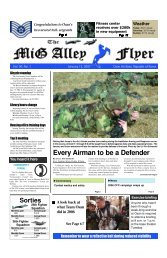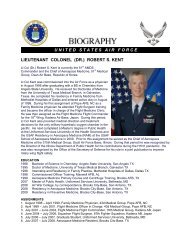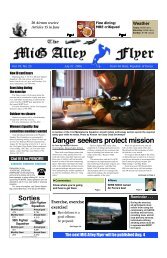Military Command Sponsorship Program.pdf - US Army Garrison ...
Military Command Sponsorship Program.pdf - US Army Garrison ...
Military Command Sponsorship Program.pdf - US Army Garrison ...
Create successful ePaper yourself
Turn your PDF publications into a flip-book with our unique Google optimized e-Paper software.
Headquarters<br />
United States Forces Korea<br />
United States Forces Korea Regulation 614-1<br />
Unit #15237<br />
APO AP 96205-5237<br />
Assignments, Details, and Transfers<br />
MILITARY COMMAND SPONSORSHIP PROGRAM<br />
30 November 2010<br />
*This regulation supersedes <strong>US</strong>FK Regulation 614-1, dated 26 October 2009.<br />
FOR THE COMMANDING GENERAL:<br />
JOHN D. JOHNSON<br />
Lieutenant General, <strong>US</strong>A<br />
Chief of Staff<br />
OFFICIAL:<br />
GARRIE BARNES<br />
Chief of Publications and<br />
Records Management<br />
Summary. This regulation prescribes policy and procedures for administering the United States<br />
Forces Korea (<strong>US</strong>FK) <strong>Command</strong> <strong>Sponsorship</strong> <strong>Program</strong> (CSP). <strong>Command</strong> <strong>Sponsorship</strong> must meet<br />
commanders’ mission readiness and continuity needs and be managed fairly, predictably,<br />
consistently, and transparently. The intent is to maximize mission readiness and continuity by<br />
aligning command sponsorship into three priorities to provide commanders flexibility to meet<br />
mission requirements most effectively, as well as to reduce the administrative and logistical burden<br />
associated with processing applications. Service members are eligible to request command<br />
sponsorship.<br />
Summary of Change. This document has been substantially changed due to tour normalization<br />
within Korea. A full review of its contents is required.<br />
Applicability. This regulation applies to all commands, units, organizations, and activities that<br />
have command-sponsored (CS) positions in Korea. <strong>Command</strong> sponsorship for civilian personnel<br />
is governed by the procedures in AK Reg 690-3.
Supplementation. Issue of further supplements to this regulation by subordinate commands is<br />
prohibited unless prior approval is obtained from <strong>US</strong>FK J1 (FKJ1-12), Unit #15237, APO AP<br />
96205-5237, email: J11WorkFlow@korea.army.mil.<br />
Forms. <strong>US</strong>FK forms are available at http://www.usfk.mil/usfk/.<br />
Records Management. Records created as a result of processes prescribed by this regulation<br />
must be identified, maintained, and disposed of according to AR 25-400-2. Record titles and<br />
descriptions are available on the <strong>Army</strong> Records Information Management System website at<br />
https://www.arims.army.mil.<br />
Suggested Improvements. The proponent of this regulation is <strong>US</strong>FK Assistant Chief of Staff<br />
(ACofS) J1. Users are invited to send comments and suggested improvements on DA Form 2028<br />
(Recommended Changes to Publications and Blank Forms) to the <strong>US</strong>FK ACofS J1 (FKJ1-12), Unit<br />
#15237, APO AP 96205-5237, email: J11WorkFlow@korea.army.mil.<br />
Distribution. Electronic Media Only (EMO).
CONTENTS<br />
Chapter 1<br />
Introduction, page 1<br />
1-1. Purpose<br />
1-2. References<br />
1-3. Explanation of Abbreviations and Terms<br />
Chapter 2<br />
Roles and Responsibilities, page 1<br />
2-1. Chief of Staff (CofS), <strong>US</strong>FK<br />
2-2. <strong>US</strong>FK Assistant Chief of Staff (ACofS) J1<br />
2-3. Service Component <strong>Command</strong>ers<br />
2-4. <strong>Garrison</strong>/Installation <strong>Command</strong>ers<br />
Chapter 3<br />
<strong>Command</strong> <strong>Sponsorship</strong> <strong>Program</strong>, page 3<br />
3-1. <strong>Command</strong> Sponsored <strong>Program</strong> (CSP)<br />
3-2. Priority 1, 2, and 3 Definitions<br />
3-3. Dual <strong>Military</strong>/Joint Spouse Service Members<br />
3-4. <strong>Command</strong> <strong>Sponsorship</strong> Database Management<br />
3-5. <strong>US</strong>FK FY 11-16 CSP Allocation by Location<br />
Appendixes, page 7<br />
A. References<br />
B. Sample Request for Priority 1 Key Billet Designation<br />
C. <strong>US</strong>FK FY 11-16 <strong>Command</strong> <strong>Sponsorship</strong> <strong>Program</strong> Allocation Matrix<br />
D. Sample Format for CSP Allocation Reports<br />
Table List<br />
3-1. <strong>Command</strong> <strong>Sponsorship</strong> Codes, page 6<br />
Glossary, page 11
Chapter 1<br />
Introduction<br />
1-1. Purpose<br />
This regulation establishes policies and procedures for administering the <strong>Command</strong> <strong>Sponsorship</strong><br />
<strong>Program</strong> (CSP) in Korea. <strong>Command</strong> sponsorship is a readiness and quality of life priority. CSP<br />
will be given the highest attention in order to best accommodate and care for Service members<br />
and their respective families. <strong>Command</strong> <strong>Sponsorship</strong> must meet commanders’ mission readiness<br />
and continuity requirements and be managed fairly, consistently, predictably, and transparently.<br />
1-2. References<br />
Required and related publications are listed in appendix A.<br />
1-3. Explanation of Abbreviations and Terms<br />
Abbreviations and terms used in this regulation are explained in the glossary.<br />
Chapter 2<br />
Roles and Responsibilities<br />
2-1. The Chief of Staff (CofS), United States Forces Korea (<strong>US</strong>FK) will -<br />
a. Ensure Services conduct quarterly reviews of Priority 1 (Key Billets-KBs), Priority 2<br />
(Component <strong>Command</strong>er Mission Continuity Requirements), and Priority 3 ((Component<br />
<strong>Command</strong>er-Managed <strong>Command</strong> <strong>Sponsorship</strong> (CS) billets)) allocations. See section II of the<br />
glossary for definitions of Priority 1, 2, and 3 CS billets.<br />
b. Be the authority to recommend approval to the Office of the Secretary of Defense (OSD) on<br />
joint KB nominations. Service components will use their internal service process (<strong>Army</strong>/Air<br />
Force/Navy/Marines) for approval on Service-specific positions.<br />
2-2. The <strong>US</strong>FK Assistant Chief of Staff (ACofS) J1 will -<br />
a. Establish policy for and overall management of the <strong>US</strong>FK <strong>Military</strong> CSP. The J1 will<br />
continually update all CSP-related policies, regulations, forms and related documents on the <strong>US</strong>FK<br />
<strong>Command</strong> <strong>Sponsorship</strong> home page for ease of access by all <strong>US</strong>FK personnel.<br />
b. Maintain, control and provide access to all applicable agencies to the <strong>Command</strong><br />
<strong>Sponsorship</strong> database on the J1 Personnel Information Management System-Korea (PIMSK)<br />
website.<br />
c. Provide PIMSK codes for CSP management to identify where the family resides and<br />
receives their respective installation support to maintain a common operating picture tracking for<br />
families.<br />
d. Ensure accuracy of the CSP database by conducting bi-monthly reviews of the CSP<br />
database. The J1 will report CSP database errors to the Service component personnel officers for<br />
correction. The J1 will post a bi-monthly CSP report to the J1’s portal under Published Documents.<br />
e. Update appendix C (<strong>US</strong>FK FY 11-16 <strong>Command</strong> <strong>Sponsorship</strong> <strong>Program</strong> Allocation Matrix)<br />
based on Services’ quarterly review.<br />
1<br />
<strong>US</strong>FK REG 614-1, 30 November 2010
f. With the assistance of DoDDS-Korea/DODEA, oversee school enrollment capacity limits<br />
and track school-aged dependents of DoD civilians, invited contractors and approved CS military<br />
families.<br />
2-3 Service Component <strong>Command</strong>ers will -<br />
a. Publish written implementation plan to ensure the CSP meets and improves mission<br />
readiness while providing equal continuity requirements that are fair, consistent, predictable, and<br />
transparent. Services will oversee CSP execution among Priorities 1, 2, and 3 billets, as defined in<br />
section II of the glossary.<br />
(1) Air Force (AF), <strong>Army</strong> and Navy will delegate CSP management authority to the<br />
appropriate command level no lower than the grade of O-6.<br />
(2) Marine Corps Forces, Korea (MARFORK) will continue to manage all Marine CSP<br />
authorizations on peninsula.<br />
b. Conduct a quarterly review to consider changes to Priority 1 (KB), Priority 2 and Priority 3<br />
billets. Provide quarterly CSP updates to the <strong>US</strong>FK <strong>Command</strong>er. Appendix D has a sample<br />
allocation report format.<br />
c. Provide monthly statistics of CSP applications disapproved by location to <strong>US</strong>FK J1 via the<br />
J11 Workflow account at J11WorkFlow@korea.army.mil by the 5th working day after the end of<br />
each month.<br />
d. Have authority to manage waiting list based on impact to unit readiness and continuity.<br />
e. Use Assignment Incentive Pay (AIP)/Korea Assignment Incentive Pay (KAIP) approvals and<br />
disapprovals to shape mission readiness and continuity.<br />
f. Appoint a primary and alternate CSP manager in writing and forward a copy of DD Form<br />
2875-PIMSK System Authorization Access Request (SAAR) to <strong>US</strong>FK J1 via email at<br />
FKJ1DM@korea.army.mil. The J1 will provide CSP managers access to the PIMSK database to<br />
edit and report on unit command sponsorship allocations.<br />
g. Ensure all CSP managers are trained and equipped to manage their Service component’s<br />
CSP Priority 1, 2, and 3 billets. Training will include the process of how to request command<br />
sponsorship, standards of processing a CSP request, provide reports to unit leadership on their<br />
command sponsorship program allocations and provide information about geographical limitations<br />
of command sponsorship in Dongducheon/Uijeongbu (Area I). <strong>US</strong>FK Policy Letter #26 has an<br />
enclosure providing an outline of limited benefits for personnel residing in Area I. <strong>Command</strong>ers will<br />
ensure Service members who desire to serve an accompanied tour in Area I complete this<br />
memorandum after having been counseled regarding the contents of the memorandum by an O-5<br />
commander or designated representative. If the family does not reside with the Service member in<br />
Area I, the Service member must request a Secretarial Overseas Housing Allowance (OHA) waiver<br />
for his/her family to reside in Seoul (Area II).<br />
h. Establish a link on each Service component’s website providing current CSP information,<br />
waiting list (if applicable), forms, regulations, command guidance to sponsors, and provide contact<br />
information to call or email questions on Service-related CSP actions.<br />
2<br />
<strong>US</strong>FK REG 614-1, 30 November 2010
i. Ensure the J1 PIMSK <strong>Command</strong> <strong>Sponsorship</strong> database is accurate and reflects the<br />
<strong>Command</strong>’s desire to align CS billets among the three CS billet priorities in order to maximize<br />
mission readiness and continuity.<br />
j. Ensure CSP allocations can be supported with available infrastructure to include (but not<br />
limited to) family housing, medical/dental support, and projected school capacity available by<br />
location.<br />
2-4. <strong>Garrison</strong>/Installation <strong>Command</strong>ers will -<br />
a. Determine the ability of an installation to support CSP (to include schools).<br />
<strong>Garrison</strong>/Installation commanders will have oversight on school capacity issues as they relate to<br />
CSP capacity. <strong>Garrison</strong>/Installation <strong>Command</strong>ers will coordinate/address school capacity issues<br />
with DODDS-K District Superintendent Office and <strong>US</strong>FK/J1.<br />
b. Have authority to arbitrate school enrollment between Service components for families with<br />
school-aged children, when school capacity has been reached. <strong>US</strong>FK J1 will facilitate this process<br />
as requested.<br />
c. Enrollment capacity at each school will be verified through the Korea District Superintendent<br />
Office (KDSO) only. Individual school registrars will not to be contacted. Direct contact to the<br />
KDSO office to coordinate student enrollment can be done by emailing the Department of Defense<br />
Dependent Schools-Korea (DODDS-K) Education Operations Manager at<br />
korea.eom@pac.dodea.edu.<br />
d. Senior commanders must have visibility over <strong>Garrison</strong>/Installation commanders' CSP status<br />
by service at their location. Senior commanders will serve as final appeal authorities of<br />
garrison/installation commander decisions. Senior commanders are listed below:<br />
(1) Dongducheon/Uijeongbu: <strong>Command</strong>er, 2d Infantry Division<br />
(2) Seoul: <strong>Command</strong>er, 8 th <strong>Army</strong><br />
(3) Pyeongtaek: Assistant Deputy <strong>Command</strong> (Support), 2d Infantry Division<br />
(4) Daegu: <strong>Command</strong>er, 19th Expeditionary Sustainment <strong>Command</strong> (ESC) (includes<br />
Chinhae students attending Daegu High School)<br />
(5) Osan: <strong>Command</strong>er, 7th Air Force (AF)<br />
(6) Chinhae: <strong>Command</strong>er, Naval Forces Korea<br />
Chapter 3<br />
<strong>Command</strong> <strong>Sponsorship</strong> <strong>Program</strong><br />
3-1. <strong>Command</strong> <strong>Sponsorship</strong> <strong>Program</strong> (CSP)<br />
a. The <strong>US</strong>FK CSP provides a systematic method of allocating CSP among Priority 1 (Key<br />
Billet), Priority 2 (Component <strong>Command</strong>er Mission Continuity Requirements), and Priority 3<br />
(Component <strong>Command</strong>er-Managed CS billets) to enhance mission readiness throughout Korea<br />
and promote continuity, predictability and stability. It also supports the tour length change and<br />
incentives in the Joint Federal Travel Regulations (JFTR) allowing more families the opportunity to<br />
3<br />
<strong>US</strong>FK REG 614-1, 30 November 2010
Permanent Change of Station (PCS) to Korea. However, based on current infrastructure<br />
limitations, all <strong>US</strong>FK areas are at or near CS capacity. As a result, CSP allocations must be<br />
managed very closely and be synchronized with mission requirements, until full tour normalization<br />
has been achieved. (See paragraph 3-2 for more details)<br />
b. Service members are eligible to request command sponsorship. See <strong>US</strong>FK <strong>Command</strong><br />
<strong>Sponsorship</strong> website for links to Service components command sponsorship processes and<br />
procedures. The intent of providing <strong>Command</strong> <strong>Sponsorship</strong> is to allow commanders flexibility and<br />
discretion to allocate CS billets to maximize mission readiness and continuity. CSP packages may<br />
be approved and a CSP number assigned up to 120 days prior to the report date of the service<br />
member with no more than a 30-day overlap with the incumbent physically in country. Once a CSP<br />
number has been assigned and if the Service member’s report date gets delayed greater than 120<br />
days, their CSP number might be revoked.<br />
c. All new CSP requests will be fully staffed through appropriate command channels for final<br />
approval IAW paragraph 2-3a.<br />
(1) CSP managers will account for all approved CSP requests in the PIMSK J1 database.<br />
(2) No Service member should be denied the opportunity to apply for command<br />
sponsorship in Korea. Disapprovals must be in writing to the Service member explaining the<br />
reason(s) why the Service member’s request was denied and what options the Service member<br />
may have to reapply at a later date.<br />
d. Requests for command sponsorship will be submitted IAW Service components instructions.<br />
According to Department of Defense Instruction (DODI) 1315.18 E4.4.2.4 (Procedures for <strong>Military</strong><br />
Personnel Assignments), personnel accepting command sponsorship must serve the accompanied<br />
tour length for the duty station location and have at least 12 months remaining on their overseas<br />
tour after arrival of dependents or approval of CS, whichever is later.<br />
e. Personnel assigned to Korea who have concurrent or deferred travel approved will have the<br />
entitlements associated with the command-sponsored position for which travel of dependents was<br />
authorized. Once the travel has been authorized, the Service member will remain assigned to that<br />
command sponsored position and will not be reassigned to another position, unless compelling<br />
mission requirements exist.<br />
f. When a change of tour status is from an accompanied tour to an unaccompanied tour or<br />
when an individual’s programmed command-sponsored assignment is canceled, a copy of the<br />
change of tour or cancellation document will be forwarded to the Service component (include<br />
previously approved CSP). The Service component CSP manager will ensure the PIMSK<br />
database is updated appropriately.<br />
g. <strong>Command</strong> sponsorship approval is valid for the Service member’s tour length.<br />
Reassignments in Korea must receive the approval of the gaining <strong>Garrison</strong>/Installation commander<br />
to change CS from one <strong>Garrison</strong>/Installation to another. This will include another Exceptional<br />
Family Member <strong>Program</strong> (EFMP) screening at the gaining installation. When a Service member<br />
who has been granted command sponsorship is subsequently selected for an assignment within<br />
Korea to a dependent-restricted tour (such as Kunsan AB), the Service member has the option of<br />
requesting to leave the Service member’s family at the Service member’s currently approved<br />
installation or requesting an early return of family members.<br />
4<br />
<strong>US</strong>FK REG 614-1, 30 November 2010
3-2. Priority 1, 2, and 3 Definitions<br />
a. Priority 1- Key Billet. Designating a position in an activity or a unit as a Priority 1 Key Billet<br />
shall be reserved for only those positions where the continued presence of an officer or warrant<br />
officer is determined to be absolutely essential to the mission of the activity or the unit or to the<br />
U.S. presence in that area. Such designations shall require the officer or warrant officer to serve<br />
24 months even if he or she declines to serve the tour accompanied, and shall be established only<br />
at overseas duty stations where the accompanied tour is at least 24 months.<br />
(1) A position may not be designated as a Priority 1 Key Billet unless all of the following<br />
apply (exceptions may be authorized only by the Principal Deputy Under Secretary of Defense for<br />
Personnel and Readiness):<br />
(a) Position is authorized a commissioned or warrant officer.<br />
(b) Government-furnished family quarters are available.<br />
(c) Concurrent travel of dependents is authorized.<br />
(d) An accompanied tour of at least 24 months is authorized for the specific location.<br />
(2) Requests to establish a <strong>US</strong>FK joint position as a Priority 1 Key Billet will be fully justified<br />
and submitted IAW appendix B to <strong>US</strong>FK J1. Service components will use their internal service<br />
process (<strong>Army</strong>/Air Force/Navy/Marines) for approval on Service-specific positions. Component<br />
commanders/staff principals have disapproval authority.<br />
(3) Requests to change the status of <strong>US</strong>FK joint staff key billets (KBs) will be staffed<br />
through <strong>US</strong>FK J1 to <strong>US</strong>FK CofS for approval prior to forwarding through United States Pacific<br />
<strong>Command</strong> (PACOM) to the Joint Staff J1.<br />
(4) Approved Service-specific KBs will be reported to <strong>US</strong>FK J1 for update in PIMSK<br />
database.<br />
b. Priority 2- Component <strong>Command</strong>er Mission Continuity Requirements. <strong>Military</strong> jobs from<br />
which commanders would benefit most by having personnel stay for 24- and 36-month tours, such<br />
as officer and enlisted leadership, Service member requiring lengthy pre- or post-arrival training or<br />
certification in order to perform their job in Korea, or low density/hard to fill skill sets.<br />
c. Priority 3- Component <strong>Command</strong>er-Managed CS billets. <strong>Command</strong>ers will have<br />
discretion in selecting the remaining number of command-sponsored positions authorized by<br />
current tour normalization availability. <strong>Command</strong>er will consider factors such as personnel<br />
returning from deployments or remote-unaccompanied tours, dual military with children, single<br />
parents, consecutive overseas tours, and junior rank opportunities.<br />
3-3. Dual <strong>Military</strong>/Joint Spouse Service Members<br />
Only one Service member needs to apply for CSP per family. In most cases, the Service member<br />
with the highest rank of the couple should submit the CSP request.<br />
5<br />
<strong>US</strong>FK REG 614-1, 30 November 2010
3-4. <strong>Command</strong> <strong>Sponsorship</strong> Database Management<br />
a. To find <strong>US</strong>FK <strong>Command</strong> <strong>Sponsorship</strong> <strong>Program</strong> information and updates, click on <strong>US</strong>FK<br />
<strong>Command</strong> <strong>Sponsorship</strong> webpage. This website provides regulatory guidance and links to Service<br />
specific command sponsorship program information on processing times, and submission<br />
procedures.<br />
b. The J1 PIMSK web-based system will be used to manage and edit command sponsorship<br />
billets online. Users must login using their CAC cards. To access the system the first time, users<br />
must first fill out a DD Form 2875 (System Authorized Access Request) form and submit to<br />
FKJ1DM@korea.army.mil . <strong>US</strong>FK J1 will grant access privileges based on Service CSP managers<br />
recommendation as either edit capable or read-only. This system is <strong>US</strong>FK’s official record for<br />
command sponsorship reports. <strong>US</strong>FK J1 will post the bi-monthly <strong>US</strong>FK CS-NCS Families Report<br />
to J1’s portal and the <strong>US</strong>FK <strong>Command</strong>er Dashboard.<br />
c. Service component CSP managers will verify PIMSK data with subordinate units. They will<br />
verify the DEROS, dependent information, and accompanied/unaccompanied tour status of<br />
incumbent. It is imperative information input into PIMSK is complete and accurate. All approved<br />
command sponsorship requests will be given a unique approval number for the location where the<br />
family will live. The table 3-1 below identifies the command sponsorship codes to enable <strong>US</strong>FK to<br />
track where families reside for support purposes:<br />
Table 3-1<br />
<strong>Command</strong> <strong>Sponsorship</strong> Codes<br />
AREA LOCATION CODE SAMPLE<br />
Area I Dongducheon Q Q1234<br />
Area I Soldier Assigned to Dongducheon, Family Resides in Area II X X1234<br />
Area I Uijeongbu (CRC, Stanley, and Jackson) R R1234<br />
Area I Soldier Assigned to Uijeongbu, Family Resides in Area II Z Z1234<br />
Area II Seoul S S1234<br />
Area III Humphreys H H1234<br />
Area IV Daegu or Pusan T or P<br />
T1234 or<br />
P1234<br />
Area V Osan O O1234<br />
Area VII Chinhae C C1234<br />
3-5. <strong>US</strong>FK Fiscal Year (FY) 11-16 CSP Allocation by Location<br />
a. Effective upon the date of this regulation, Service components are directed to manage the<br />
CSP allocation levels by location at appendix C. These allocation levels are based on unit moves,<br />
movement plans and the increased installation infrastructure and school capacities. The goal is to<br />
grow allocation levels at <strong>US</strong>AG Humphreys as rapidly as possible while maximizing the number of<br />
Service members on 2- and 3-year accompanied tours at enduring installations to increase mission<br />
readiness and continuity.<br />
b. <strong>US</strong>FK J1 will align the CSP web-based system with the approved CSP allocation levels to<br />
execute the current year allocation. Allocation levels may be executed at any time during the FY,<br />
provided objectives are met by end of FY.<br />
6<br />
<strong>US</strong>FK REG 614-1, 30 November 2010
Appendix A<br />
References<br />
Section I. Required Publications<br />
AR 55-46 (Travel Overseas).<br />
AR 420-1 (<strong>Army</strong> Facilities Management)<br />
AR 608-75 (Exceptional Family Member <strong>Program</strong>)<br />
DODI 1315.18 (Procedures for <strong>Military</strong> Personnel Assignments)<br />
Joint Federal Travel Regulations<br />
MILPERSMAN 1300-700 (Exceptional Family Member (EFM) <strong>Program</strong>-Navy)<br />
U.S. /ROK Status of Forces Agreement (SOFA)<br />
Section II. Related Publications<br />
AFI 32-6001 (Family Housing Management)<br />
AR 614-30 (Overseas Service)<br />
DOD 4165.63-M (DOD Housing Management)<br />
MCO P11000.22 w/Ch 1-5 (Marine Corps Housing Management Manual)<br />
NAVFACP-930 (Navy Family Housing Manual)<br />
OPNAVINST 1740.3C (<strong>Command</strong> Sponsor and Indoctrination <strong>Program</strong>s)<br />
Section III. Required Forms<br />
DD Form 2875 (PIMSK System Authorization Access Request (SAAR))<br />
7<br />
<strong>US</strong>FK REG 614-1, 30 November 2010
Appendix B<br />
Sample Request for Priority 1 Key Billet Designation<br />
(Use Letterhead Stationery)<br />
OFFICE SYMBOL<br />
DATE<br />
MEMORANDUM THRU <br />
SUBJECT: Request for Priority 1 Key Billet Designation<br />
1. Complete unit designation: Include title of manpower document, date of manpower document,<br />
and UIC.<br />
2. <strong>Command</strong> sponsored sequence number:<br />
3. Paragraph and line number of position:<br />
4. Grade and position title:<br />
5. Service:<br />
6. Justification: Primary emphasis should be placed on why the position is considered one of<br />
unusual responsibility and the reasons a mandatory 24-month tour is considered essential for<br />
continuity of operations and mission accomplishment.<br />
7. The POC is MSG Smith, DSN 723-XXXX or via email at John.Smith2@korea.army.mil.<br />
ANDREW B. GORDON<br />
CPT, <strong>US</strong>A<br />
Assistant Adjutant General<br />
8<br />
<strong>US</strong>FK REG 614-1, 30 November 2010
Appendix C<br />
<strong>US</strong>FK FY 11-16 <strong>Command</strong> <strong>Sponsorship</strong> <strong>Program</strong> Allocation Matrix (As of the effective date<br />
of this Regulation)<br />
Location<br />
Dongducheon<br />
Uijongbu<br />
Seoul<br />
Seoul (2ID)<br />
Pyeongtaek<br />
Daegu<br />
Osan<br />
Chinhae<br />
Total<br />
Location<br />
Dongducheon<br />
Uijongbu<br />
Seoul<br />
Seoul (2ID)<br />
Pyeongtaek<br />
Daegu<br />
Osan<br />
Chinhae<br />
Total<br />
FY 11<br />
<strong>Army</strong> AF Navy Marines Total<br />
Obj<br />
FY 12<br />
<strong>Army</strong> AF Navy Marines Total<br />
Obj<br />
FY 13<br />
<strong>Army</strong> AF Navy Marines<br />
557 0 0 0 557 457 0 0 0 457 413 0 0 0 413<br />
280 0 0 0 280 219 0 0 0 219 219 0 0 0 219<br />
1204 130 80 46 1460 1136 130 80 46 1392 1078 130 80 46 1334<br />
172 0 0 0 172 172 0 0 0 172 172 0 0 0 172<br />
817 4 0 0 821 1046 4 0 0 1050 1148 4 0 0 1152<br />
600 44 0 0 644 600 44 0 0 644 600 44 0 0 644<br />
110 517 4 1 632 110 517 4 1 632 110 517 4 1 632<br />
0 0 70 0 70 0 0 70 0 70 0 0 70 0 70<br />
3740 695 154 47 4636 3740 695 154 47 4636 3740 695 154 47 4636<br />
FY 14<br />
FY 15<br />
FY16<br />
<strong>Army</strong> AF Navy Marines Total <strong>Army</strong> AF Navy Marines Total<br />
Total<br />
<strong>Army</strong> AF Navy Marines<br />
Obj<br />
Obj<br />
Obj<br />
413 0 0 0 413 137 0 0 0 137 0 0 0 0 0<br />
219 0 0 0 219 219 0 0 0 219 0 0 0 0 0<br />
556 130 40 46 772 546 2 0 0 548 50 2 0 0 52<br />
172 0 0 0 172 86 0 0 0 86 0 0 0 0 0<br />
1670 4 0 0 1674 2042 132 40 46 2260 2980 132 40 46 3198<br />
600 44 0 0 644 600 44 0 0 644 600 44 0 0 644<br />
110 517 4 1 632 110 517 4 1 632 110 517 4 1 632<br />
0 0 110 0 110 0 0 110 0 110 0 0 110 0 110<br />
3740 695 154 47 4636 3740 695 154 47 4636 3740 695 154 47 4636<br />
Total<br />
Obj<br />
9<br />
<strong>US</strong>FK REG 614-1, 30 November 2010
Appendix D<br />
Sample Format for CSP Allocation Report<br />
CSP OPPORTUNITY<br />
DISTRIBUTION BY PRIORITY<br />
BY UNIT<br />
UNIT Strength Pri 1/KB KB % Pri 2/MC MC % Pri 3 Pri 3 % TOTAL % OPP<br />
TOTAL 0 0 0 0 0 0 0 0 0<br />
.<br />
I (Casey) I (CRC) II II II III IV V<br />
Dongducheon Uijongbu Dongducheon Uijongbu Seoul Pyeongtaek Daegu Osan<br />
UNIT Q R X Z S H T&P O<br />
TOTAL 0 0 0 0 0 0 0 0<br />
10<br />
<strong>US</strong>FK REG 614-1, 30 November 2010
Glossary<br />
Section I. Abbreviations<br />
ACofS<br />
AIP<br />
AFI<br />
CON<strong>US</strong><br />
CSP<br />
DEROS<br />
DODDS<br />
EFMP<br />
HHG<br />
IAW<br />
JCS<br />
KAIP<br />
KB<br />
MCO<br />
OSD<br />
QCCC<br />
PCS<br />
PIMSK<br />
POV<br />
RFO<br />
ROK<br />
SAAR<br />
UIC<br />
<strong>US</strong>FK<br />
Assistant Chief of Staff<br />
Assignment Incentive Pay (<strong>Army</strong>)<br />
Air Force Instruction<br />
Continental United States<br />
<strong>Command</strong> Sponsored Position<br />
Date Eligible for Return from Overseas<br />
Department of Defense Dependent Schools<br />
Exceptional Family Member <strong>Program</strong><br />
Household Goods<br />
In Accordance With<br />
Joint Chiefs of Staff<br />
Korea Assignment Incentive Pay (Air Force)<br />
Key Billet<br />
Marine Corps Order<br />
Office of the Secretary of Defense<br />
Quarterly Component <strong>Command</strong>ers’ Conference<br />
Permanent Change of Station<br />
Personnel Information Management System-Korea<br />
Privately Owned Vehicle<br />
Request for Orders<br />
Republic of Korea<br />
System Authorization Access Request<br />
Unit Identification Code<br />
United States Forces Korea<br />
11<br />
<strong>US</strong>FK REG 614-1, 30 November 2010
Section II. Terms<br />
Accompanied tour. The tour length that is the longest at a specific overseas duty station and<br />
normally means that military personnel are accompanied by command sponsored dependents.<br />
Also referred to as accompanied by dependents tour.<br />
<strong>Command</strong> Sponsored (CS) Allocation. Allocations are established to support the <strong>US</strong>FK<br />
<strong>Command</strong>er’s quality of life priority for Tour Normalization and support the increase number of<br />
families coming to Korea. CSP allocations are limited only by the installation’s capacity to support<br />
(including, but not limited to, government housing, DODD Schools, and medical support). Every<br />
Service member is eligible to request command sponsorship. Tour status (accompanied/<br />
unaccompanied) is at the option of the incumbent. Government housing is not guaranteed and will<br />
be provided on a space-available basis only.<br />
<strong>Command</strong> sponsored dependents. Family members of military personnel residing with the<br />
sponsor at his or her duty station outside the continental U.S. where the accompanied tour is<br />
authorized and the sponsor is authorized to serve said tour, where family members meet the<br />
following conditions:<br />
a. Entitled to travel to the military personnel’s duty station at Government expense incident to<br />
the service member’s PCS orders.<br />
b. Are authorized by the appropriate authority to be at the service member’s duty station.<br />
c. As a result of their residence in the vicinity of the service member’s duty station, said military<br />
personnel are entitled to station allowances at the “with dependent” rate.<br />
Concurrent travel. Family members’ travel authorized at the same time as the sponsor (requires<br />
that adequate Government or economy quarters as defined by AR 210-50 be available in the<br />
vicinity of the sponsor’s duty station within 60 days after arrival of command sponsored family<br />
members).<br />
Deferred travel. Family members whose travel must be deferred to a time after their sponsor has<br />
arrived at his or her new duty station because Government quarters or economy quarters are not<br />
available within 60 days after arrival of the sponsor in the overseas command, but will be available<br />
within 140 days. The overseas commander must approve travel of family members. Travel will<br />
normally be within 10 days of quarter’s availability (Government or economy).<br />
Dual <strong>Military</strong>/Joint Spouse Service Members. Married military service couples on an approved<br />
2-year accompanied tour who maintain a joint household in a command sponsored area and who<br />
receive all benefits and privileges including travel entitlements associated with such status.<br />
Eligibility for Government controlled family housing will accrue only if one or both spouses are<br />
assigned against a position on the PIMSK.<br />
Exceptional Family Member. A family member with any physical, emotional, developmental, or<br />
intellectual disorder that requires special treatment, therapy, education, training, or counseling.<br />
Family Member. An individual whose relationship to the sponsor leads to entitlement to benefits<br />
and privileges. Family member travel refers exclusively to permanent change of station actions.<br />
12<br />
<strong>US</strong>FK REG 614-1, 30 November 2010
<strong>Garrison</strong>/Installation <strong>Command</strong>er. The term refers to the commander of the organization,<br />
activity, or military community who has overall command responsibility for EFMP where the Service<br />
member or employee is assigned.<br />
Installation. The organization, activity, or military community that has overall command<br />
responsibility for EFMP where the Service member or employee is assigned.<br />
Noncommand Sponsored Family Member. Dependents of military personnel residing with the<br />
sponsor at his or her duty station outside the continental U.S. where an accompanied tour may or<br />
may not be authorized. Includes dependents “acquired” through marriage, adoption or other<br />
action, and those who may enter the command without endorsement by the appropriate authority.<br />
These dependents will not be entitled to travel to and from the sponsor’s overseas duty station at<br />
Government expense. They will not entitle the sponsor to station allowances at the “with<br />
dependent” rate. Under the U.S. /ROK Status of Forces Agreement, U.S. statutes, congressional<br />
guidance, DOD policy, or military service regulations, these dependents may be denied access to<br />
certain dependent support facilities.<br />
Priority 1-Key Billet. Designating a position in an activity or a unit as a key billet shall be reserved<br />
for only those positions where the continued presence of an officer or warrant officer is determined<br />
to be absolutely essential to the mission of the activity or the unit or to the U.S. presence in that<br />
area. Such designations shall require the officer or warrant officer to serve 24 months even if he or<br />
she declines to serve the tour accompanied, and shall be established only at overseas duty<br />
stations where the accompanied tour is at least 24 months.<br />
Priority 2-Component <strong>Command</strong>er Mission Continuity Requirements. <strong>Military</strong> jobs from which<br />
commanders would benefit most by having personnel stay for 24- and 36-month tours, such as<br />
officer and enlisted leadership, Service member requiring lengthy pre- or post-arrival training or<br />
certification in order to perform their job in Korea, or low density/hard to fill skill sets.<br />
Priority 3-Component <strong>Command</strong>er-Managed CS billets. <strong>Command</strong>ers will have discretion in<br />
selecting the remaining number of command-sponsored positions authorized by current tour<br />
normalization availability. <strong>Command</strong>er will consider factors such as personnel returning from<br />
deployments or remote-unaccompanied tours, dual military with children, single parents,<br />
consecutive overseas tours, and junior rank opportunities.<br />
Sponsor. A person who is a member of the Armed Forces serving on active duty, or civilian<br />
employee of the Department of Defense and a citizen or national of the United States; and who is<br />
authorized to transport dependents to or from an overseas area at Government expense and is<br />
provided an allowance for living quarters in that area.<br />
Unaccompanied Tour. The tour length that is authorized at a specific overseas duty station for<br />
military personnel who are not accompanied by command sponsored dependents.<br />
13<br />
<strong>US</strong>FK REG 614-1, 30 November 2010


